Interesting Interview: Edward Pettit
Just about a year ago, the Sherlockian world was buzzing with people talking about a new podcast, Sherlock Mondays, from The Rosenbach Museum and Library in Philadelphia. Manager of Public Programs, Ed Pettit was going to host a weekly discussion with a rotating cast of noted Sherlockians live each week on YouTube to discuss the stories we all love. I will admit that I only watched one, as YouTube isn't my preferred way to spend time. But when I discovered the episodes are also in an audio format, I downloaded a few to check them out. I fully admit that I am late to this party, but these discussions are SO GOOD!
And the biggest reason for this great show is Ed Pettit. I'm going to presume that most readers here have watched or listened to some episodes of Sherlock Mondays, so I'll be preaching to the choir here when I say that Ed is a charming and engaging host of this show. I got to meet Ed in person last January and can attest that his energy and interest in the Sherlockian world goes beyond those sessions. He's very active in the Philadelphia scion society, The Sons of the Copper Beeches, is a member of other groups, has consulted on a Sherlockian book, has given scores of Sherlockian presentations at The Rosenbach, and most interestingly hosted Sherlockian reading groups, game nights, and cocktail parties. As you'll see below, Ed Pettit is a guy you want to spend time with!
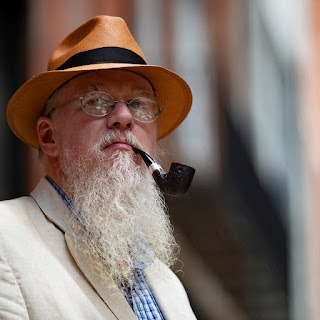
How do you define the word “Sherlockian”?
If you enjoy Sherlock Holmes and want to further explore theuniverses in which those stories occur, then you’re a Sherlockian. All gates and doors are open, just enter andengage. So you can be a Sherlockian whoprimarily engages in just movies or TV adaptations. But for me, all Sherlockians exist in twotypes: those who have read all of Doyle’s Sherlock Holmes adventures and thosewho have yet to read all of Doyle’s Sherlock. And as much as I love talking to Sherlockianswho have read everything (and then some), it’s actually those who are stillreading the stories for the first time whom I envy. That’s the Sherlockian Iwish I could always be.
How did you become a Sherlockian?
I think it was a gradual process. Sherlock Holmes stories inmovies and books were always there for me. Sherlock has a strong presence inpopular culture, so I think I always engaged in small ways with Sherlock.However, around the time when the Granada Holmes TV series with Jeremy Brettwas first airing in the U.S. (I was around 19 or 20), my Dad gave me a completeStrand edition with the Paget illustrations. My Dad wasn’t a Sherlockian,although he likely read some of the stories. I think he just found the book onthe discount table at a big bookstore and thought I would like it. And I read the stories and LOVED them,especially in their facsimile format. It was almost like encountering thestories like the first readers did. This was a world I wanted to be in. But what I can’t remember is if I startedreading the stories, then discovered Jeremy Brett, or if I saw some Brettepisodes and then started reading. The discovery of both is intertwined in mymemory.
My deeper involvement as a Sherlockian came when I became amember of the Philadelphia scion society, The Sons of the Copper Beechesseveral years ago. I am now a Master Copper-Beech-Smith and the Recorder ofPedigrees for the SoCB. For many years, Steve Rothman had suggested I join, butI always hesitated because the group was male-only in those days, and I didn’twant to belong to a gender-segregated organization. The first meeting Iattended was the first one that allowed women to participate and I have beenkeenly involved ever since.
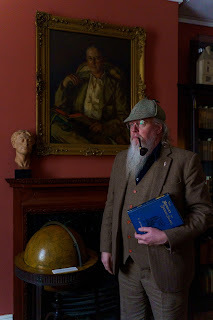
What is your profession and does that affect how you enjoy being a Sherlockian?
I create public programs for a rare book museum inPhiladelphia, The Rosenbach Museum & Library, with an astounding collectionof books and manuscripts. For the Rosenbach, I’ve hosted literary-themedcocktail parties, organized marathon readings of Moby-Dick and Dracula,set up reading courses for a many works of literature, interviewed authors, andon and on. But these days, I mostlycreate web-series called Biblioventures, featuring works from our collections.Over the past few years, I’ve hosted shows on Dracula, Frankenstein, JaneEyre, Pride and Prejudice, The Pickwick Papers, and Sherlock Holmes (As youcan see my interests lie in the 19th Century; I didn’t grow thisbeard for nothing), in which cohosts and I talk about books serially, over manyweeks, or months, in a kind of “conversational annotation.” Most of these showsalso feature cocktails, and I smoke my pipe throughout all of them (thebenefits of hosting them from my home office). Basically, my job is to drink,smoke, and talk about books.
Our founder, Dr. Rosenbach, also collected (and sold) ACD’sworks and we have Doyle’s manuscript of “The Adventure of the Empty House,” aswell as correspondence from Baker Street Irregular founders Christopher Morleyand Edgar Smith, and Vincent Starrett. So creating a Biblioventure series that highlighted this part of ourcollection was really exciting for me. Moreon Sherlock Mondays below. Butbasically, part of my job is getting to play in the Sherlock universe (and getpaid for it).
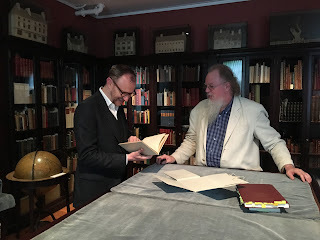
What is your favorite canonical story?
I think my favorite short story is still “The Man with theTwisted Lip,” but that may be because it was also my favorite Jeremy Brettepisode. I love what it says about identity and creativity. Neville St. Clairis a “legitimate” journalist who finds a way to make more money playing thebeggar Hugh Boone. I think there’s something going on there in Doyle’ssubconscious as a serious historical novelist who makes even more moneycreating his Sherlock Holmes adventures. I don’t think Doyle was ashamed of his Sherlockian output, but he wascertainly bemused and sometimes annoyed that his most successful work was notliterarily important. Also, whenever I need to use a pseudonym, I use HughBoone. One time I submitted poetry to a magazine (whose main editor I knew) asHugh Boone, so he would give me honest feedback. “Blue Carbuncle” and “Scandalin Bohemia” also rank very high because they are perfectly constructednarratives.
My favorite novel is probably still The Sign of the Four.I think Hound is likely a better novel as a work of fiction, but theworld Doyle evokes in Sign, the characters, the backstory about thestolen treasure, the chase at the end, are still very thrilling. It’s theadventure I want to go on with Sherlock and Watson. And I would definitelysmoke the hookah with Thaddeus Sholto.
Who is a specific Sherlockian that you think others wouldfind interesting?
I’ve met so many over the years and pound-for-poundSherlockians might be the most interesting people of all the many literary fangroups I’ve been part of. Such a richdiversity of minds. Attending scion meetings, or the BSI weekend, I am alwaysexcited to just listen to everyone tell their stories. The Sherlockian whom Iam getting to know right now is Olivia Rutigliano, BSI and editor at LitHub andCrimeReads. She’s cohosted a couple of special Sherlock Mondays episodes ondetective stories that were published when Doyle stopped writing Sherlockstories after “The Final Problem.” Olivia is so brilliant and knows so muchabout 19th Century literature (she’s going to be cohost on my nextBiblioventures series called Monsters and Ghosts, featuring Strange Case ofDr. Jekyll and Mr. Hyde and A Christmas Carol). Ask her about ladydetective stories. You won’t be sorry. With that said, I’d also have to say themost interesting Sherlockian to me will be the next one I meet.
What subset of Sherlockiana really interests you?
I’m a literary historian, so I’m always interested in thepublication and reception of Doyle’s works and how their literary reputationhas developed over time. Because of this, I rarely play The Game. I enjoyreading what others write in Game-mode, but I’m too invested in Doyle as anauthor to do this myself. I’m also a big fan of genre crossover adaptations,especially with monsters or science fiction (Monstrum Opus of SherlockHolmes, Campbell and Prepolec’s anthologies like Gaslight Grimoireand Gaslight Grotesque).
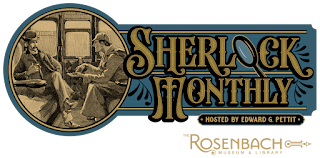
How did Sherlock Mondays come about?
During the Covid pandemic, I had to work at home and figureout ways to continue public programs for the Rosenbach. Thus, Sundays withDracula was born. We have a substantial Bram Stoker collection at theRosenbach, including Stoker’s research notes for Dracula. So I hosted a weekly show with rotatingcohosts, talking about one chapter per week of the novel. I also brought inspecial guests (Leslie Klinger, Kim Newman, David Skal, Sir ChristopherFraying, and Mark Gatiss) for some of the episodes and created a signaturecocktail for every show. This show wassuch a success that we continued with other novels from our collections.Because I have to invest so much of myself into these shows (they are verypersonality driven), I need to choose books I can live with and be interestedin talking about for months on end. So, all of the books so far have also beenpersonal favorites of mine.
Sherlock Holmes stories were a perfect fit for the showbecause of both our collection and my own interests. Sherlock Mondays began inSeptember 2023 and streamed live for 40 episodes, all free to watch on theRosenbach’s YouTube channel (except for eight eps on The Hound of theBaskervilles, which were subscription only). We had great BSI membercohosts and special guests, who I think all may have been interviewed here onthis blog over the years (Anastasia Klimchynskaya, Mary Alcaro, Monica Schmidt,Curtis Armstrong, Scott Monty, Burt Wolder, Leslie Klinger, Mark Jones, PaulChapman, Steve Doyle, Max Magee). And Mary Alcaro, a great mixologist, createdall the Sher-locktails for the program. I also smoked a different pipe forevery episode. In effect, I got paid to talk about Sherlock Holmes for 40 weeksthis year (and drank my way through it all!). We covered everything from AStudy in Scarlet through the “Empty House,” in published order, and now theshow will become Sherlock Monthly, starting in November 2024. We’ll pickup with “The Norwood Builder,” and every month I’ll have a different cohost totalk about a story with me. To finishthe Canon, this will probably take about three years. Yes, I realize how luckyI am.
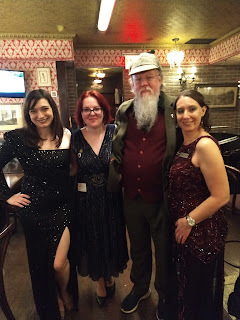
What are some of your favorite moments from SherlockMondays so far?
I love it best when the cohosts and I go down rabbit-holesabout details and that happened on almost every episode. But honestly, becauseI do the show live for over 30 weeks in a row, they kind of blend together inmy head. There’s no post production and just as one ends, I am working on thenext one, so I get no time to reflect on what we’ve done. It’s always aboutwhat’s next (and for me that will be Jekyll and Hyde which begins onSeptember 23, 2024).
What book would you recommend to other Sherlockians?
Even though Les Klinger’s New Annotated Sherlock isthe gold standard for Sherlockian books, I still get a visceral pleasurerereading William Baring-Gould’s Annotated Sherlock. I can only imaginewhat it was like for its first readers. Nothing like this had ever been writtenfor a fictional universe. If you are a new Sherlockian, I think this is the onebook to get.
And if you are an already deeply committed Sherlockian andyou haven’t read Doyle’s other works yet, I would recommend, hisgothic/supernatural stories. You can find lots of different editions of these.My favorite is probably Gothic Tales edited by Darryl Jones for Oxford UniversityPress, but there’s also the excellent Tales of Unease collection, editedby David Stuart Davies for Wordsworth. Doyle was a brilliant writer of scarystories.
Where do you see Sherlockiana in 5 or 10 years from now?
I think it will continue as it has been, becoming more andmore open to all kinds of different people with different tastes and viewpoints.Sherlockiana used to be a white male world adept at gatekeeping. And that’s notunique to Sherlock. This has been the case for most reading communities fromShakespeare to Austen to Dickens to Doyle. Their devoted readers wanted to keeptheir authors to themselves and frowned upon interlopers. I see that kind ofgatekeeping disappearing rapidly over the years, especially as works that wereformerly considered “popular culture” have completely crashed into the world ofcanonical literature. The result is a far richer place where we have theopportunity to experience new and exciting viewpoints that come from readers,not just trained specialists.
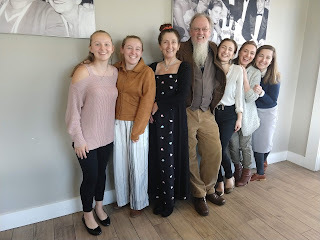 Ed with his wife and five daughters
Ed with his wife and five daughters


